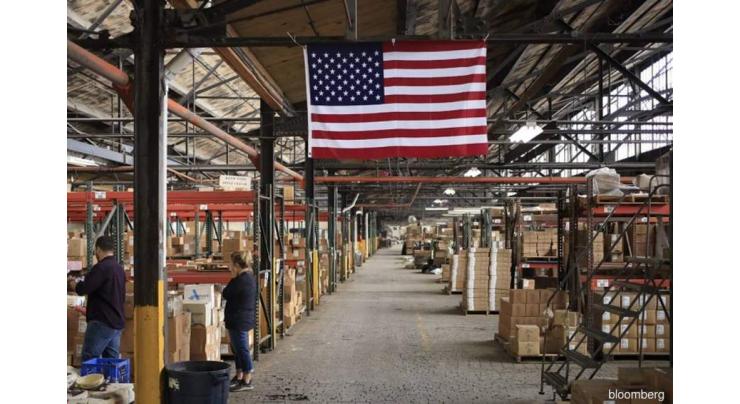
US Producer Prices Down Most Since 2020, Proving Weight Of Fed Interest Rate Hikes
Sumaira FH Published January 18, 2023 | 10:55 PM

Producer prices in the United States fell the most in nearly three years in December, the US Labor Department said in a report on Wednesday, underlining the weight of the Federal Reserve's interest rate hikes in tamping down inflation
WASHINGTON (UrduPoint News / Sputnik - 18th January, 2023) Producer prices in the United States fell the most in nearly three years in December, the US Labor Department said in a report on Wednesday, underlining the weight of the Federal Reserve's interest rate hikes in tamping down inflation.
The Producer Price Index (PPI), a measure of the price retailers pay when they buy products from manufacturers in large quantities, decreased 0.5% last month versus forecasts for a drop of 0.1% and against a growth of 0.3% in November. Historical data from the Labor Department showed it was the largest decline since April 2020.
"The last 6 months of the PPI MoM gains now add to 0.0%," economist Greg Michalowski said in a post on the ForexLive forum. "Pipeline input inflation is coming back down."
President Joe Biden welcomed the slump in price growth and the relief it accorded Americans.
"Price increases outside of food, energy, and trade services slowed and are at their lowest level since March 2021," Biden said, adding that this coincided with 50-year lows in unemployment.
US inflation, as measured by the Consumer Price Index, expanded by 6.5% during the year to December, after hitting a four-decade high of 9.1% during the 12 months to June. The drop came after relentless interest rate hikes last year by the Fed, which added 425 basis points to rates between March and December.
Prior to that, rates peaked at just 25 basis points, as the central bank slashed them to nearly zero after the global COVID-19 outbreak in 2020.
Despite its aggressive monetary tightening, inflation remains more than three times higher than the 2% per annum level preferred by the Fed, which has promised to continue raising rates until price growth returns to its target.
"The lag impact of elevated inflation weighs heavily on US households, it's very clear that the median American consumer is still reeling from the loss of wages in inflation-adjusted terms," Joseph Brusuelas, chief economist at RSM US LLP, said in comments carried by the Wall Street Journal.
Brusuelas also said that based on the current trajectory of the economy, a "mild recession" at least might be on the cards for 2023.
Economists remain at odds with policy-makers on the probability of a US recession, with the Atlanta division of the Fed forecasting a 4.1% gross domestic product, or GDP, growth for the fourth quarter of 2022 after a 3.2% expansion in the third quarter. The Conference Board, an economic analysis and forecasting group, said it expects GDP growth to slow to 0.2 percent for all of 2023.
Related Topics
Recent Stories

Punjab CM inaugurates Pakistan’s first Virtual Women Police Station

Dutch model Donny Roelvink embraces Islam

Experts raise concerns over introduction of 10-stick packs

Iranian president arrives in Karachi

Law Minister expresses Govt's resolve to address issue of missing persons

Rizwan’s batting order may be changed: Sources

Nawaz Sharif to visit Guangzhou exhibition in China

FM Dar not traveling to China: Foreign Office

PM takes notice of deliberate delay in tax cases

Iranian President visits Allama Iqbal’s mausoleum

Iranian President arrives in Lahore today

Currency Rate In Pakistan - Dollar, Euro, Pound, Riyal Rates On 23 April 2024
More Stories From World
-
Migrant boat capsizes off Djibouti leaving 21 dead
5 hours ago -
Tesla profits tumble 55% as EV sales under pressure
5 hours ago -
Talks on global plastic treaty begin in Canada
6 hours ago -
Migrant deportations loom after parliament passes UK-Rwanda plan
6 hours ago -
Macron in last-ditch bid to halt EU vote battering
6 hours ago -
Ukraine moves to bring military-aged men home to fight
7 hours ago
-
Asia hit hardest by climate change, extreme weather: UN weather agency
7 hours ago -
Muscles and masterpieces: Louvre offers Olympic sport sessions
7 hours ago -
Migrant boat capsizes off Djibouti leaving 16 dead
7 hours ago -
UK Rwanda law sparks fear among migrants hoping to cross Channel
10 hours ago -
China issues highest-level rainstorm warning after deadly floods
10 hours ago -
UK's Sunak announces raised defence spending, new Ukraine aid
10 hours ago